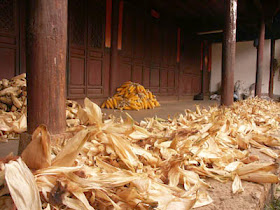Researchers have found that cooking farm waste - especially 'wet' waste such as corn husks, tomato vines and manure - can turn it into biofuels to produce energy, the Business Standard reports.
Dry farm waste, such as wood chips or sawdust, is easier to use for generating power. Scientists have struggled to find uses for wet and green waste.
Researchers led by engineering professor Animesh Dutta, director of the Bio-Renewable Innovation Lab (BRIL) at the University of Guelph in Canada, have found a solution: pressure cooking.
Cooking farm waste yields compact, easily transportable material that will not degrade and can be used in energy-producing plants.
Dutta said the research which is published in the journal Applied Energy, shows that in a lab setting, biofuels can produce the same amount of energy as coal.
"What this means is that we have a resource in farm waste that is readily available, can produce energy at a similar level to burning coal, and does not require any significant start-up costs," said Dutta.
"We are taking what is now a net-negative resource in farm waste, which farmers have to pay to remove, and providing an opportunity for them to make money and help the environment.
"It's a closed-loop cycle, meaning we don't have to worry about external costs," Dutta said.
The new biofuel product made by the BRIL researchers produces a product that has less alkali and alkaline earth metals, allowing them to be used at power plants.
"We're able to produce small amounts of energy in our lab from these biofuels," said Dutta.
Dutta said large pressure cookers located near farms could accept and cook waste for transport to energy plants."We're looking at a timeline of five to seven years, depending on the funding," he said.
"Once we have a commercial system set up, we'll be self-sufficient. It can reduce our energy costs and provide an environmental benefit," he added.
Read the article HERE.
Dry farm waste, such as wood chips or sawdust, is easier to use for generating power. Scientists have struggled to find uses for wet and green waste.
Researchers led by engineering professor Animesh Dutta, director of the Bio-Renewable Innovation Lab (BRIL) at the University of Guelph in Canada, have found a solution: pressure cooking.
Cooking farm waste yields compact, easily transportable material that will not degrade and can be used in energy-producing plants.
Dutta said the research which is published in the journal Applied Energy, shows that in a lab setting, biofuels can produce the same amount of energy as coal.
"What this means is that we have a resource in farm waste that is readily available, can produce energy at a similar level to burning coal, and does not require any significant start-up costs," said Dutta.
"We are taking what is now a net-negative resource in farm waste, which farmers have to pay to remove, and providing an opportunity for them to make money and help the environment.
"It's a closed-loop cycle, meaning we don't have to worry about external costs," Dutta said.
The new biofuel product made by the BRIL researchers produces a product that has less alkali and alkaline earth metals, allowing them to be used at power plants.
"We're able to produce small amounts of energy in our lab from these biofuels," said Dutta.
Dutta said large pressure cookers located near farms could accept and cook waste for transport to energy plants."We're looking at a timeline of five to seven years, depending on the funding," he said.
"Once we have a commercial system set up, we'll be self-sufficient. It can reduce our energy costs and provide an environmental benefit," he added.
Read the article HERE.
The Global Miller
This blog is maintained by The Global Miller staff and is supported by the magazine GFMT
which is published by Perendale Publishers Limited.
For additional daily news from milling around the world: global-milling.com


This written piece gives fastidious understanding yet.Dan
ReplyDelete